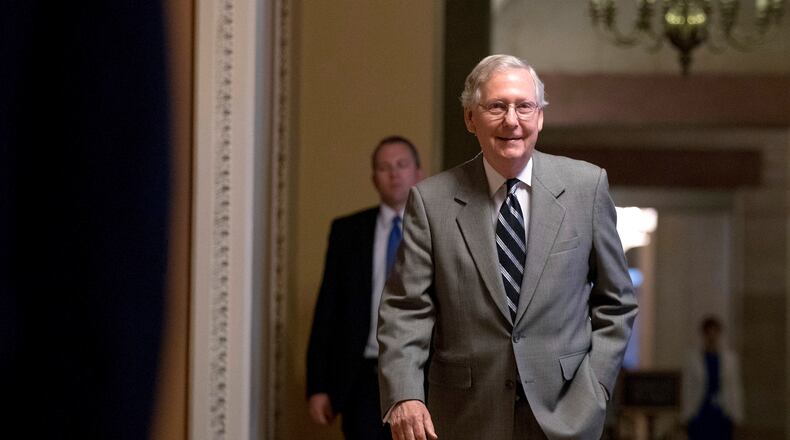Senate GOP leaders have made change after change to their health care legislation to try to persuade Republican senators to vote for it. But that has not changed the flow of estimates showing that while the government would save money, large numbers of Americans — including more than a half-million Georgians — would lose health insurance.
It was the same thing with estimates for two new versions this week.
A proposal to simply repeal Obamacare could lead to 32 million additional Americans losing health insurance over a decade, according to the Congressional Budget Office. A Georgia State University researcher, Bill Custer, on Thursday broke that down to about 1 million Georgians. An earlier analysis of simple repeal by the left-leaning Georgia Budget and Policy Institute predicted it would also cost the state about 71,000 jobs. A new poll by The Associated Press found the measure is supported by just 13 percent of Americans.
The very latest CBO analysis, posted Thursday morning, estimated that a GOP plan to repeal and replace the Affordable Care Act would lead to 22 million fewer Americans having health insurance by the end of a decade. Custer said that would equate to about 680,000 Georgians.
The two plans appeared dead earlier this week when enough Republican senators to block a GOP majority announced they could not support one or the other proposal.
But senators left Washington for a long weekend Thursday, exhortations by Republican leadership still ringing in their ears that a vote must take place after all, next week. But leaders switched gears on which of the two versions it would be.
Both could help out the deficit by more than $400 billion, according to the estimates.
The latest news came after yet another seesaw in the bill’s fortunes. Senate GOP leader Mitch McConnell had seemed to declare defeat, but President Donald Trump called the GOP holdouts to meet. They did, but without coming to agreement. Still, by Thursday afternoon news was circulating that one of the staunchest Republican holdouts, U.S. Sen. Rand Paul of Kentucky, was saying he might help vote to open official debate on the measures, as long as he got a chance to vote for total repeal.
Some supporters remained steadfast.
“I appreciate the efforts of the administration at every step of the process to move beyond the failures of Obamacare,” McConnell said Wednesday, as Trump pressed senators to keep the effort alive. “Obamacare was imposed on our country seven years ago. It has been hurting the people we represent ever since.”
But other advocates on the issue seemed to greet the roller coaster of news with fatigue.
Asked for its thoughts on what the Senate should do, a spokeswoman for the Georgia Chamber of Commerce, a coalition of the state’s businesses, simply forwarded a letter that the Chamber had written back in June, saying it would suffice. The Chamber struck a familiar tone with other interest groups: “… we do have concerns … express our concerns … widely publicized concerns …” It called out issues specific to conservative businesses, including hospitals being stuck with unpaid bills.
A spokesman for a doctors lobbying group, the Medical Association of Georgia, said it had not taken a formal position. But it “had discussed its concerns related to the legislation with Sens. Johnny Isakson and David Perdue, including the uncertainty of the Medicaid program.”
Within the past two weeks, a staunch medical conservative and Obamacare opponent from Georgia, former U.S. Rep. Phil Gingrey, wrote that it was too late to simply repeal the Affordable Care Act. It was time, he said, to "retain, repair and revise."
Contacted Thursday, some Georgia GOP elected officials seemed not to want to come anywhere near the issue. A spokeswoman for Gov. Nathan Deal said he couldn’t comment on legislation he hadn’t read.
Asked what he had told the state’s senators, the spokeswoman, Jen Talaber Ryan, replied, “Throughout this process, the governor has maintained that any proposal should not punish Georgia or other non-expansion states,” referring to states that did not expand Medicaid under Obamacare.
The numbers released this week reflect the different things the proposals would do. In the plan to repeal and replace Obamacare, senators would direct more money toward shoring up the insurance market, giving states an additional $70 billion for a “Stability and Innovation Program.” The theory is that would lead to more people being able to afford to keep their insurance.
In the other recent proposal, to simply repeal Obamacare, the increase in uninsured Georgians would largely be privately insured ones, Custer said. Although they may voluntarily drop their insurance, he said, that often means they’ve decided they can’t afford it.
“To some extent, that may be a choice,” Custer said, “but they’ll be choosing between food and rent and health insurance.”
Every version of the legislation put forth since this spring could save the federal budget more than $100 billion. But they could all also lead to more than a half-million Georgians going without health insurance, Custer has estimated.
“All the versions of this bill leave in place the block granting of Medicaid,” Custer told The Atlanta Journal-Constitution. “That estimate is constant through all of this. And every change they’ve made affects the private insurance market in ways that decrease it.”
He emphasized that the CBO, a nonpartisan office, included in its estimates predictions of what states will do. So Georgia could decide to do things that would change the numbers a lot, such as raising taxes to pay to cover more people.
HEALTH CARE IN THE U.S.AND GEORGIA
Health care has been a dominant national issue for years and has had a huge impact on Georgia. To track every twist in the story, follow The Atlanta Journal-Constitution's coverage at http://www.myAJC.com/politics.
About the Author
Keep Reading
The Latest
Featured



